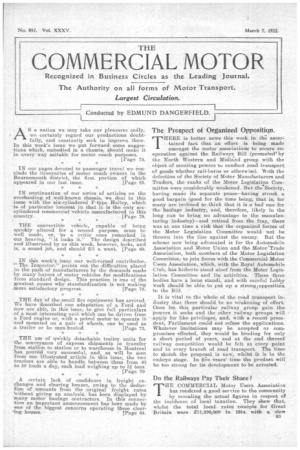The Prospect of Organized Opposition.
Page 1

If you've noticed an error in this article please click here to report it so we can fix it.
THERE is better news this week in the ascertained fact. that an effort is being .made amongst the motor associations to secure cooperation against the Railways Bill (promoted' by .. the North Western and Midlaed group with the object of securin,g powers to conduct road transport of goods whether rail-borne or otherwise). 'With the defection of the Society of Motor Manufacturers and Traders, the ranks of the Motor Legislation Committee were considerably weakened. But the Society, having made its separate peace—having struck a good bargain (good for the time being, that is, for many are inclined to think that it is a bad one for the haulage industry, and, therefore, likely in the long run to bring no advantage to the manufacturing industry)—and retired from the fray, there was at one time a risk that the organized forces of the Motor Legislation Committee would not be thrown into the line against the enemy. But the scheme now being advocated is for the Automobile _Association and Motor Union and the Motor"Trade Association, both members of the Motor Legislation Committee, to join forces with the Commercial Motor Users Association, which, with the Royal Automobile Club, has hitherto stood aloof from the Motor Legislation Committee and its activities. These three bodies have it locus standi, and with careful Lobby work should be able to put up a strongAopposition to the Bill.
It is vital to the whole of the road transport industry that there should be no weakening of effort. Once let this particular railway group gain the powers. it seeks and the other railway groups will apply for like privileges, and, with a recent precedent, Parliament could not refuse the applications. Whatever limitations may be aecepted or come promises effected, they would be binding for only a short period of years and at the end thereof railway competition would be felt at every point and in every branch of road transport. The time to skoteh the proposal is now, whilst it is in the embryo stage. In fiv'et years' time the product will be too strong for its development to be arrested.






























